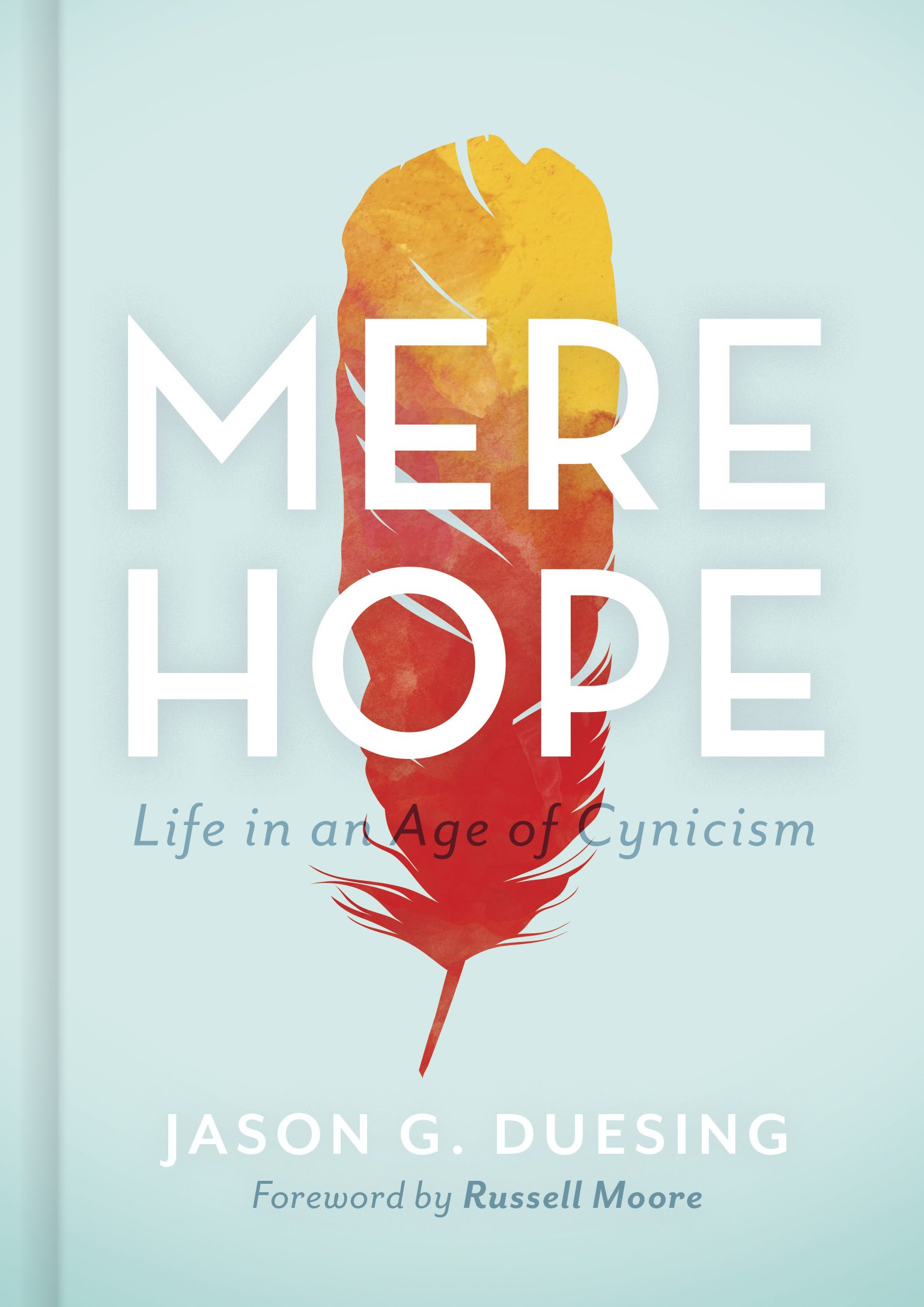A Book Review from Books At a Glance
By Dan DeWitt
Not every academic can write for normal people. I mean that, of course, as a compliment to normal people. It’s not that the masses cannot understand complex ideas. It’s that often academics don’t understand those ideas well enough themselves to talk about them in normal language.
C.S. Lewis said it best, “I have come to the conviction that if you cannot translate your thoughts into uneducated language, then your thoughts were confused.” That’s what makes this new book by Dr. Jason Duesing such a delightful read. He’s translating the historical, biblical, and theological foundations of Christian hope in a clear, concise, and compelling manner. In short, he’s written a book for normal people. It’s well worth your time to take and read.
Mere Hope: Life in an Age of Cynicism is a pastoral work. It’s an invitation to reflect on what makes the Christian hope unique and how the Christian hope makes the Christian unique in a cynical world. It’s a guide for those who find themselves in “darkness, despairing, discouragement, trials, sufferings, injustice, and any other besetting maladies” to remind them “hope can be found.”
Duesing unpacks this hope through three memorable sections: Look Down (Mere Hope’s Fountain), Look Out (Mere Hope’s Flourishing), and Look Up (Mere Hope’s Focus). Each section introduces the reader to what Christians have believed about hope throughout the history of the church. He faithfully demonstrates how Christian hope is founded in the biblical text, in God’s revelation of himself. And Duesing consistently explains how the Christian hope provides a framework for understanding who God is and understanding our place in his world.
Though the book borrows from the famous title of C.S. Lewis’s Mere Christianity, it has a different aim. Whereas Lewis’s classic work focused on outsiders, explaining to unbelievers what Christians believe, Duesing is primarily focused on insiders, reminding believers of the difference their belief can and should make in their daily lives.
Mere Hope is not short on application. Duesing regularly leads the reader to take biblical truths to heart. He points them to ways that Christian hope can and should be expressed in our prayers, our songs, and our daily conversations.
This is the ideal book for a millennial trying to make sense of how they can be faithful to the Bible while living in the twenty-first century. The Bible doesn’t simply give us a detached set of promises and commands. It situates our hope in the context of a world ravaged by the curse of sin. In a world that seems overshadowed by skepticism and cynicism, the Christian hope illuminates a path forward.
This book would also be helpful for those who wish to lead in the local church. C.S. Lewis believed that the ability to talk about theology in common language should be a prerequisite for leadership in the church. Lewis wrote, “a passage from some theological work for translation into the vernacular ought to be a compulsory paper in every Ordination examination.” Mere Hope provides a masterful example of how this can be done. If you desire to lead Christians to better understand the hope of the gospel, this book will be a valuable resource and guide.
G.K. Chesterton once said, “The simplification of anything is always sensational. Thus monotheism is the most sensational of things: it is as if we gazed long at a design full of disconnected objects, and suddenly, with a stunning thrill, they came together into a huge and staring face.” Mere Hope offers this kind of simplification without becoming over-simplification, a watering down of truth. Duesing’s book helps us see the face of our hope, the Lord Jesus Christ, with application for how we should now live.
To be clear, Jason Duesing has demonstrated his academic abilities elsewhere. So, this book is far less about proving expertise than about applying truth. His recent book is aimed at keeping Christians from the pitfalls into which we can easily and unintentionally fall.
Christians can become so heavenly-minded that we are of no earthly good. You can call that idealism. Or we can become so earthly-minded we are of no heavenly good. You can call that pragmatism. Duesing has struck a wonderful balance. He has called it Mere Hope. But whatever you prefer to call it, you should pick it up and read it. It will be good for your soul. I know it was for mine.
Dan DeWitt (PhD, Southern Seminary) is the founding director of the Center for Biblical Apologetics and Public Christianity at Cedarville University where he serves as an associate professor of applied theology and apologetics. Dan is the author of Life in the Wild: Fighting for Faith in a Fallen World (The Good Book Compay, 2018). He posts regularly on his blog Theolatte.com.
